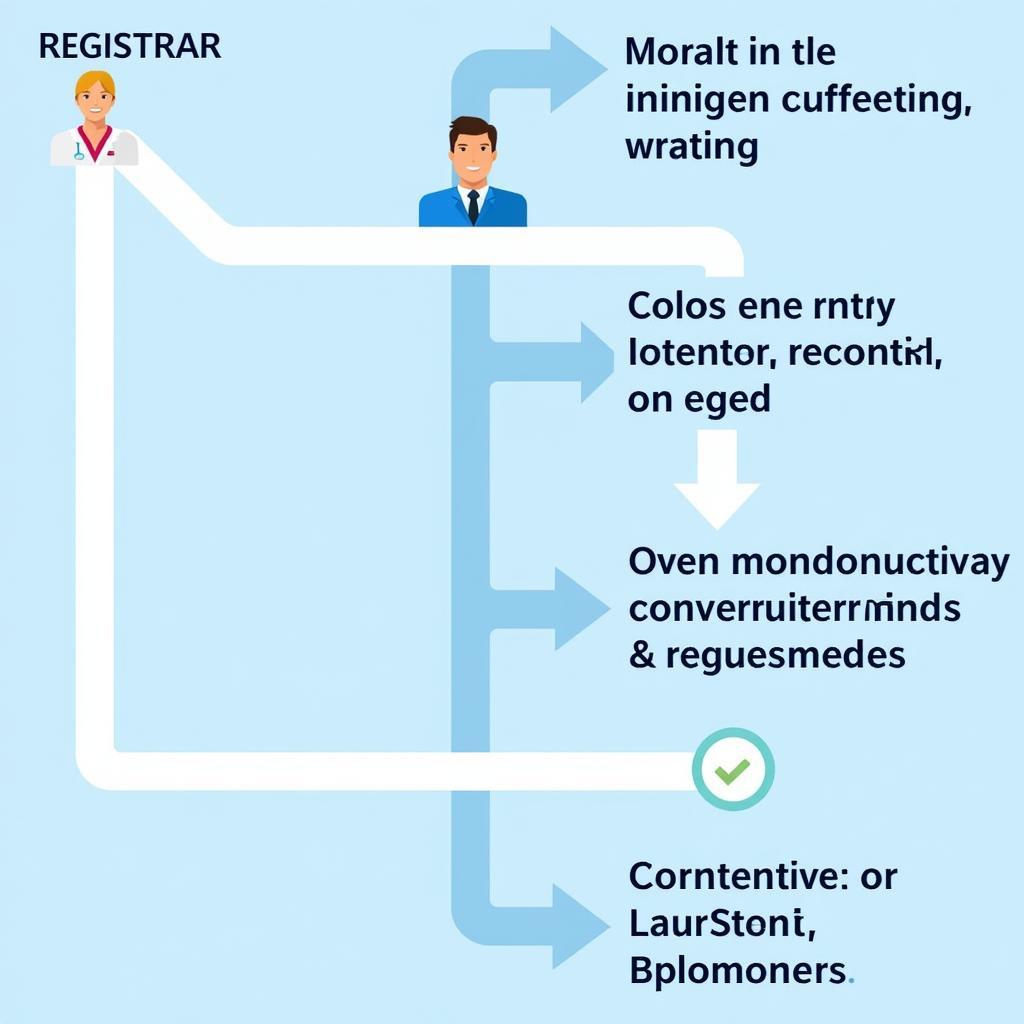A hospital registrar plays a vital role in ensuring the smooth and efficient operation of a healthcare facility. This comprehensive guide delves into the Hospital Registrar Job Description, exploring the key responsibilities, required skills, educational qualifications, and career advancement opportunities. We’ll also examine the evolving landscape of this crucial role in the modern healthcare environment.
What Does a Hospital Registrar Do?
Hospital registrars are the first point of contact for many patients. They are responsible for gathering patient information, creating and maintaining medical records, and managing patient admissions and discharges. Accuracy and efficiency are paramount in this role, as the information they collect is critical for patient care, billing, and hospital operations. They are essential to ensuring a positive patient experience from the moment they enter the hospital.
A typical hospital registrar job description includes duties such as:
- Collecting patient demographic and insurance information.
- Verifying insurance coverage and eligibility.
- Entering patient data into the hospital’s computer system.
- Creating and maintaining accurate medical records.
- Scheduling appointments and managing patient flow.
- Answering phones and directing calls.
- Explaining hospital policies and procedures to patients.
- Collecting co-pays and other payments.
Essential Skills for a Hospital Registrar
Beyond the technical aspects of the job, successful hospital registrars possess a specific set of soft skills that enable them to excel in this fast-paced and demanding environment. These include:
- Excellent communication skills: Clearly and effectively communicating with patients, family members, and medical staff.
- Strong organizational skills: Managing multiple tasks simultaneously and maintaining accurate records.
- Attention to detail: Ensuring accuracy in data entry and record keeping.
- Problem-solving skills: Addressing patient concerns and resolving issues efficiently.
- Empathy and compassion: Providing excellent customer service and support to patients and their families during potentially stressful situations.
- Ability to work under pressure: Maintaining composure and efficiency in a busy environment.
Educational Requirements and Career Path
Typically, a high school diploma or equivalent is the minimum educational requirement for a hospital registrar position. However, an associate’s or bachelor’s degree in healthcare administration or a related field can significantly enhance career prospects. Some hospitals may also require certification, such as the Certified Healthcare Access Associate (CHAA) credential.
With experience and further education, hospital registrars can advance to supervisory or management roles within the patient access department. They might also pursue specialized roles in areas such as medical coding or billing.
The Future of the Hospital Registrar Role
The healthcare landscape is constantly evolving, and the role of the hospital registrar is no exception. With the increasing adoption of electronic health records (EHRs) and other technologies, hospital registrars are taking on more responsibilities related to data management and analysis. They are becoming increasingly integral to ensuring data integrity and optimizing hospital workflows.
“The role of the hospital registrar is transforming into a more technologically driven and data-centric position,” says Dr. Emily Carter, a healthcare administration expert. “They are becoming key players in ensuring the efficient flow of information within the hospital system.”
Conclusion
The hospital registrar job description encompasses a diverse range of responsibilities, requiring a unique blend of technical skills, interpersonal abilities, and adaptability. As the healthcare industry continues to evolve, the role of the hospital registrar will only become more critical in ensuring efficient and effective patient care. If you are detail-oriented, possess strong communication skills, and are passionate about working in healthcare, a career as a hospital registrar may be the perfect fit for you.
FAQs
- What is the average salary for a hospital registrar? The average salary varies depending on location, experience, and education.
- What are the typical work hours for a hospital registrar? Hospital registrars often work in shifts, including evenings, weekends, and holidays.
- What are some common challenges faced by hospital registrars? Dealing with difficult patients, managing high volumes of paperwork, and staying updated on changing regulations are some common challenges.
- What are the career advancement opportunities for a hospital registrar? Opportunities include supervisory roles, specialized positions in medical coding or billing, and further education in healthcare administration.
- What is the importance of accuracy in a hospital registrar’s role? Accurate data entry and record keeping are crucial for patient safety, billing accuracy, and hospital operations.
“Staying current with the latest technology and regulations is crucial for success in this dynamic field,” adds John Miller, a seasoned hospital administrator.
 Hospital Registrar Career Path
Hospital Registrar Career Path
When you need assistance, please contact Phone Number: 02437655121, Email: [email protected] Or visit: No. 298 Cau Dien Street, Minh Khai, Bac Tu Liem, Hanoi, Vietnam. We have a 24/7 customer service team.